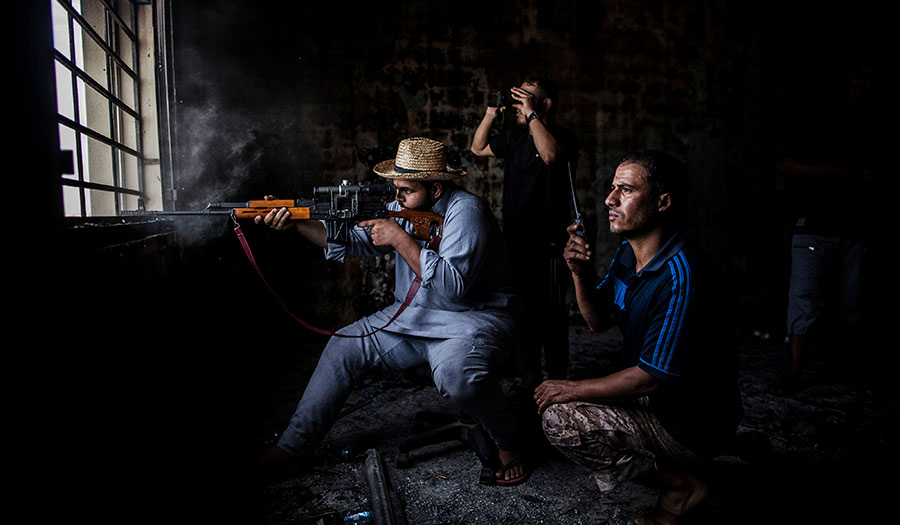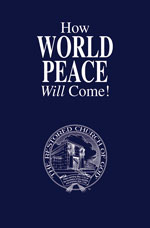 AP/Manu Brabo
AP/Manu Brabo
Article
Learn the why behind the headlines.
Subscribe to the Real Truth for FREE news and analysis.
Subscribe NowWaterloo. Gettysburg. Stalingrad. Midway. All were considered some of history’s “greatest” battles on account of how they changed the course of events in their times.
Yet of all the great battles of history, the greatest one has not yet had a turning point—mankind’s war against war itself.
“It has been said that all nations are either preparing for war, at war or recovering from war,” our booklet How World Peace Will Come! states. “It has also been noted that history has recorded over 14,600 wars. And this figure was derived in the mid-1960s.”
Still, with the arrival of 2020, it seemed humanity gained a solid foothold in at least one crucial battle. “A Third World War—which so many had feared—has been avoided,” United Nations Secretary-General Antonio Guterres remarked during a commemoration for the world peacekeeping organization’s 75th anniversary. Though “it took two world wars, millions of deaths and the horrors of the Holocaust for world leaders to commit to international cooperation and the rule of law,” the UN chief said, the world has held its longest period in modern history without a military confrontation between the most powerful nations.
The UN was born out of World War II’s devastation to prevent conflict. But the gleaming report was dampened by another reality: The number of wars occurring across the world is actually increasing.
Mr. Guterres noted that the number of countries involved in “violent conflicts” was the highest in 30 years, and that the number of people killed in conflicts has risen tenfold since 2005.
Ultimately, the course of events in 2020 did not break mankind’s trend of unending wars—they fulfilled it.
Year of Bloodshed
A skirmish-turned-war between Armenia and Azerbaijan that broke out in September left thousands dead in a matter of weeks. Each side fought over the separatist Nagorno-Karabakh region—which lies within Azerbaijan but has been under the control of ethnic Armenian forces for more than a quarter-century. Both sides accused each other of escalating hostilities, adding fuel to already simmering tensions between the ex-Soviet nations even after the conflict officially ended with a Russian-brokered peace deal that made Azerbaijan the clear winner.
As part of the deal, “The parties are exchanging prisoners and war dead, Armenian forces are to withdraw even from territory not lost in the fighting, and Russian peacekeepers have arrived to protect a corridor between Armenia proper and Nagorno-Karabakh for at least five years,” the Council on Foreign Relations reported.
But for “Armenia, coming to grips with defeat will mean an intense and emotional political struggle,” it stated. The “overriding theme of Armenia’s domestic debate” will be “about fixing blame for military defeat, vilifying those who negotiated the November 9 agreement (the foreign minister has already resigned), and rebuilding Nagorno-Karabakh’s defenses. Even if the government survives, it will have little incentive to talk to Azerbaijan.”
Meanwhile, the “leverage that once obliged Azerbaijan to take negotiations seriously has suddenly disappeared.” As a result, violence is likely to erupt again.
“Nagorno-Karabakh was for decades one of the Russian periphery’s so-called frozen conflicts. After its brief and unexpected unfreezing, it is almost certain to become one again” (ibid.).
The war in the South Caucasus and its shaky aftermath modeled many of 2020’s battles around the globe, with two sides settling a dispute through bloodshed, only for it to breed more tension.
China and India had their deadliest clash in 58 years fighting over disputed territory in the Himalayas.
Ethiopia fell into civil war as its northern region of Tigray held regional elections in defiance of the national government. Government forces invaded the rebellious region’s capital, cutting off communication and triggering a humanitarian crisis for potentially hundreds of thousands who could not access aid.
These new conflicts clouded public attention from ongoing armed conflicts in Yemen, Syria, Libya, Burkina Faso, South Sudan, the Ivory Coast, and Afghanistan, which, despite a U.S.-Taliban peace agreement requiring a “significant and nationwide” reduction in violence, has remained the deadliest ongoing conflict in the world.
Further, many smaller situations of instability threatened to launch entire states into armed conflict: a coup in Mali, protests in Peru that took down two presidents in a week, millions in Venezuela starving as its two governments remained at odds after elections, a potentially disastrous no-deal Brexit looming as negotiations with the EU returned fruitless, Hong Kong’s pro-democracy lawmakers resigning en masse, and Lebanon’s entire government resigning amid widespread discontent over the ruling elite’s handling of conditions that led to the devastating explosion in Beirut, killing at least 200 and injuring thousands.
In addition to armed conflicts, Mr. Guterres noted “geopolitical tensions are escalating, nuclear weapons remain on hair-trigger alert.”
At times, the threat of a major war between larger powers seemed to reach the brink. The Persian Gulf was once again a hotspot after the U.S. drone strike that killed Iran’s top military commander, Qasem Soleimani. U.S.-China relations were also shaky, with threats passed between the nations over Taiwan and both closing one another’s consulates in the summer. And Russian President Vladimir Putin unveiled the first hypersonic missile, which could reportedly fly 27 times faster than the speed of sound and left the U.S. military pondering defense strategies.
Think again of the UN chief’s words on the state of global conflict. Despite unprecedented efforts—international collaboration, aversion of total war, and active presence of peacekeepers in hotspots—conflicts and threats of all-out war are increasing.
Never Ending?
“While men have created many amazing technological inventions, they cannot ‘create’ peace,” our booklet on peace states. “Scientists have unleashed the power of the atom but are powerless to ‘unleash’ peace upon Earth. Astronomers have discovered much about the size, majesty and precision of the universe, but they cannot ‘discover’ the way to peace. They can find galaxies far away throughout the universe, but they cannot ‘find’ peace here on Earth.”
This is not for lack of genuine effort.
Put together, nations spend trillions on defense budgets, with the U.S. alone estimated to spend $934 billion from October 1, 2020, to September 30, 2021. Nations see beefed up military budgets and an arsenal of nuclear weapons as a method of averting conflict.
Meanwhile, diplomats use political clout to pursue deals. The historic agreement between Israel and the United Arab Emirates, with U.S. President Trump’s oversight, in August was intended to bring “full normalization of relations between Israel and the United Arab Emirates,” according to a joint statement. A White House official said the Abraham Accords, as it was called, would help create more “peace agreements” in the region.
No matter what mankind tries, nothing ends the tide of killing. Why?
The answer lies in the words of the Bible. Though it may at first seem disheartening, it is a crucial first step to understanding how the world can finally win the war against war.
Continue reading from our booklet that explains why peace is elusive: “As part of an extensive prophecy about world conditions in our time, the prophet Isaiah answers this question: ‘The WAY of peace they know not; and there is no judgment in their goings: they have made them crooked paths: whosoever goes there shall not know peace’ (59:8). The solutions of men always lead to more wars, ruin, misery, death and destruction. The apostle Paul wrote, quoting Isaiah, ‘And the way of peace have they NOT KNOWN’ (Rom. 3:17).”
Without God’s guidance and education, people simply cannot prevent war from happening! The complicated conflicts of 2020 further prove man has not been able to learn the way to peace.
Of course, no one purposely seeks violence. Though there is a fascination with the idea of war—look at the popular war films that gross hundreds of millions of dollars—no sane person wants to be subjected to war’s terrible effects.
God, the author of the Bible, knows this. Contrary to the popular notion that His Word is a collection of gruesome accounts of sword battles and violent divine judgment upon unsuspecting flesh, one of the central themes of the Bible is peace—world peace.
This is why God tells man directly that it does not know the “way of peace”—it is because He alone does!
After He was born on Earth, Jesus Christ was prophesied to “give light to them that sit in darkness…to guide our feet into the way of peace” (Luke 1:79).
Isaiah 9 adds He would be called “The Prince of Peace” (vs. 6) and that of “the increase of His government and peace there shall be no end…” (vs. 7).
This is the good news the Bible contains for all nations, especially those consistently rocked by insoluble wars and civil strife.
But in order to grasp the message, governments need to look to God as the sole author of peace. Without this change of thinking, the cycle of war is doomed to repeat.
Read about how lasting accord will come to a war-weary world—How World Peace Will Come!
More on Related Topics:
- As U.S. Block of Oil Supply Deepens Energy Crisis, Cubans Ask: What More Can We Sacrifice?
- Egypt’s Drone Deployment to Border Raises Stakes in Sudan’s Civil War
- Atomic Scientists Set ‘Doomsday Clock’ Closer to Midnight Than Ever
- U.S. Seizes Russian-Flagged Tanker Tied to Venezuela as Trump Widens Oil Push
- President Trump Threatens Iran Over Protest Crackdown as Deadly Unrest Flares



